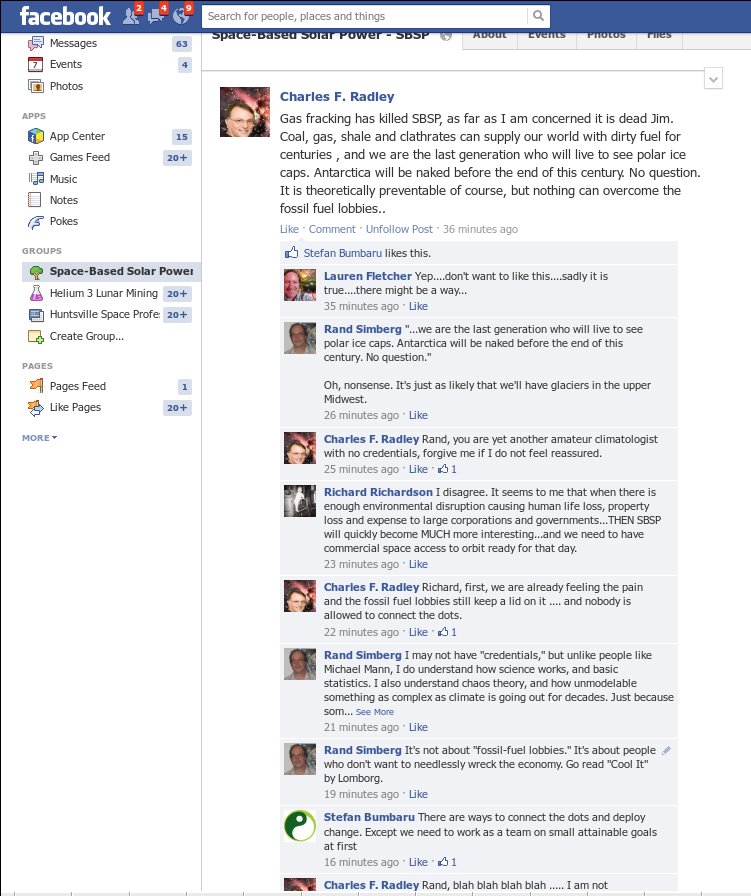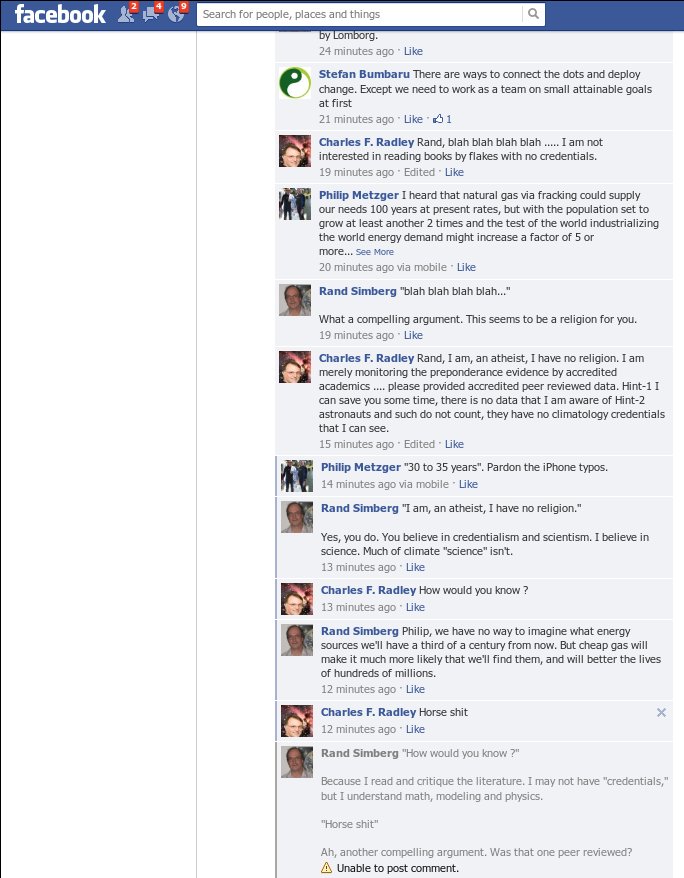This is amusing.
Charles Radley subscribed me to the Space-Based Solar Power Facebook group some time ago (not at my request, but there’s not enough traffic on it that I really care). Apparently, like his climate “scientist” heroes, he will brook no dissent from the creed — he seems to have banned me. Here are the screen shots of the exchange, in case he decides to delete my posts as well.


That boob opened his mind so far his brain fell out.
As Elon said, it’s “unfortunate” that technology has solved our energy needs and we don’t need the solar-electric alternatives that he’s peddling. The only way to stay relevant is to tax or ban the competition.
Actually Elon had gone even further when he said that space based solar power does not make sense for Earth power applications. That it makes more sense to just place the solar panels on Earth in the first place.
I am somewhat unsure of his assertion given that solar panels in space can be exposed to the Sun 24h a day, have higher efficiency because there is no atmospheric cloud cover, plus the beaming technology itself may pass through cloud cover in a more efficient fashion. There is also a question if such an energy grid may make sense even if the satellites provided no generation capacity by themselves. Imagine being able to send power to any place on Earth by beaming it on demand. The potential applications are just too numerous to be brushed aside just like that.
“Antarctica will be naked before the end of this century”
“Rand, you are yet another amateur climatologist with no credentials”
Radley is wrong about Antarctica, loss of the ice cape is going to be a slow process that’ll take around a thousand years, so he doesn’t look too expert himself.
a slow process that’ll take around a thousand years
If it happens at all.
If this nut really believes what he says is true, he can propose we replace SBSP with Earth-cooling flux-shields!
Flux shields, bigger space-based versions of the maxi-shields that cover his sensitive mangina.
You mean we have enough carbon fuels to last centuries?
Cool!
Yes.. that’s why “deep methane” is so threatening to the “sustainable” power industry.
What’s more, this isn’t even surprising, everyone knew domestic shale would replace coal and foreign oil in the US as soon as the price points started to match.
There was never a question you had at least a couple of centuries of coal left. The tar sands and shale resources are also quite large. This was even in the IEA reports which mentioned oil production would increasingly rely on unconventional oil resources.
What some reports, like the Hirsch report, questioned was the ability to transition to the new sources at a rapid enough pace and how economic these new sources of transportation fuel would be. It still remains to be seen. The fact is oil is a lot more expensive than it was in the 1990s. The crisis sort of helped because unemployed people usually don’t use a lot of oil or energy but prices have spiked since.
In the limit you can just use Fischer-Tropsch to convert natural gas or coal to oil. Some places like Qatar have already started operating natural gas to oil plants because liquid methane is so low density that it isn’t very profitable to export by tanker. However these plants take a long time to build so a ramp up would take a long time. The oil wouldn’t be particularly cheap either albeit still cheaper than current prices.
If by “deep methane” you mean methane clathrate deposits those have so low energy density and are so deep under the sea that they will be a last ditch resort that, if used, will only happen a century from now. I certainly hope we will have found something better by then.
Canadian tar sands and US shale oil may cover the gap until other operations like the one in Orinocco come online. North America certainly has the transportation fuel supply issue covered in the middle term. The rest of the world is a more complicated issue due to a lack of exploration.
That’s a very long post to demonstrate that you have no idea what we’re talking about.
“Deep methane” refers to the ability of fracking to access non-fossil methane in the Earth’s crust. As it is unrelated to fossils, there’s a potentially much greater supply of it.
Ok so its abiogenic methane. How deep is this supposed to be anyway?
Radley has been signing folks up to his various lists for years, it is a sort of hobby with him. In his defense he will remove you promptly if asked.
But sadly, he really is not terribly well rounded scientifically, he latched on to the space solar power stuff a couple decades ago and is sure that the only reason the sky is not full of them is some terrible conspiracy.
Basically you just pay him on the head, say “there there…” when he whines and go about your business.
Yes, I know that he’ll remove if asked, but I’ve never bothered. I get so much other spam that this doesn’t bother me that much — once in a while there’s something interesting. On the other hand, I’m amused that he decided to effectively ban me and tamp down dissent. As I said, he’s emulating his climate-“science” heroes.
What a coward. What kind of grown man can’t handle someone disagreeing with them?
He’s apparently afraid I’ll corrupt the weak minds at his Facebook page.
Time to make a public bet with him, then.
Polar ice caps, present or not, in, say 20 years.
(Or if he means “by the time the current generation of 15 year olds is dead, well… he’s conveniently made it so nobody can call him on it directly, but you can bet on ice coverage relative to now, and percentage of loss.)
$10k to the charity of the other’s choice, say.
Such bets have a wonderful history of going against the pseudo-Malthusian side.
What do ice caps have to do with Malthus? He wrote about the relationship between population and resources, not climate.
He did say pseudo. The link between energy requirements and population is a bit more complicated than the link between calories and population–energy per person would likely increase as technology progresses, whereas calories per person stays about the same (although richer nations tend to prefer a less efficient calorie source). Anyway, yeah, the analogy is a bit stretched, and neo-luddism might have been better.
The calorie is a unit of energy.
Yes, I know that. Modern farming basically turns fossil-fuel calories into food calories (at a more or less 1:1 ratio). Energy used for food is going to scale more or less linearly with population, energy used for other facets of life would scale with population and with technical level.
But neo-luddism is about being again technological progress as a solution to environmental problems.
SBSP requires a lot more technology to produce than simply continuing to use fossil fuels, even that required for deep drilling which is why there are no SBSP systems today. So, strictly speaking the neo-luddites would be those wishing to stay with the existing energy production systems…
Then I seem to have been using the term wrong. I’ve been assuming neo-luddism was a general opposition to all technology and a particular opposition to new technology.
Elon is assuredly one of the good guys, and a fantastic technologist, which makes it very unfortunate that he’s bought into CAGW and Peak Oil and made big business bets that it’s real. (If it turns out to be not real, which seems increasingly likely.)
Bruce,
I don’t see that. There are markets for both Tesla and Solar City independent of what happens with global warming. So Elon will win either way.
Agreed that Tesla is a good thing. The research going into Solar City is a good thing too, but I’m not so sure it’s a good investment.
But Elon really does seem to have bought into CAGW if his tweets are anything to go by.
“Rand, you are yet another amateur climatologist with no credentials, forgive me if I do not feel reassured.”
What are Radley’s credentials? And who besides him is saying Antarctic ice sheet has only a century left?
Actually the lack of credentials and peer review data is one of the issues in the climate debate.
http://www.huffingtonpost.com/mark-boslough/global-warming-scholarshi_b_2422438.html?utm_hp_ref=science
Mark Boslough
Physicist; Fellow of the Committee for Skeptical Inquiry
Global Warming: Scholarship vs. Pseudoscholarship
Posted: 01/06/2013 10:55 pm
My point is that Radley is a damnable hypocrite for trotting out the “you’re not credentialed” logical fallacy against Rand when Radley himself is not a professional climate scientist.
The “you’re not credentialed” excuse could be levied at journalists. The vast majority of news stories are reported by people who are not professionally trained in the fields relevant to said stories.
The fallacy could also be directed at our elected representatives. How many members of the House and Senate finance committees have degrees in finance, economics, accounting or even business administration? How many of the people who voted for Obamacare are medical doctors or health insurance professionals? Where’s Algore’s climatology degree?
I don’t give a damn about credentials if the arguer can accurately and cogently cite evidence.
Wow, Radley must have gone downhill. I don’t remember him being this bad in the old Usenet days.
Alan, to the best of my knowledge Radley has no credentials as a climatologist. None. Zip. Square root of squat. Which makes him at least as qualified as most climate alarmists. He seems to think the future of the human race hangs on the fate of SPS, a dubious position at the best of times.
I’ve wondered how I got on Radley’s FB like for some time. I never read his stuff. At least not after I posted a comment to the effect of: “So you want to combat ‘global warming,’ brought about by the earth being unable to radiate away a tiny amount of insolation, by beaming to earth huge amounts of energy from solar radiation the would otherwise have missed the earth entirely?”
His answer was that the problem was not with more solar energy coming in, but with not enough able to get out. I stopped reading after that…
His answer was that the problem was not with more solar energy coming in, but with not enough able to get out.
Wow. So he thought that answered your question rather than bolster your point?